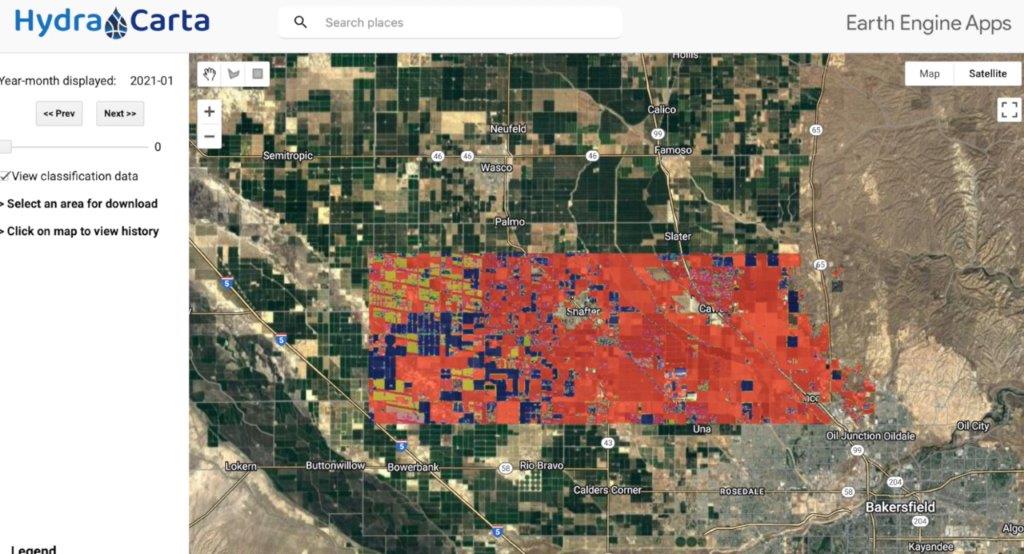Toward Satellite-Based Information for Efficient Water Use and Yield Forecasting in California
This project establishes a new collaboration between four UC institutions (UC Los Angeles, UC Davis, UC Riverside, and UC Agriculture and Natural Resources) on irrigation water management. The specific research objectives of this planning/pilot project are three-fold:
- On Soil Moisture (SM): To evaluate innovative ground-based remote sensing technologies for developing high-quality, field-level, spatially distributed across a large domain, ground-truth data on soil moisture;
- On Evapotranspiration (ET): To evaluate existing algorithms for estimating ET from satellite data, and to identify gaps and uncertainties; and
- On Crop Yield Forecast: To develop spatio-temporal database on crop yield and auxiliary variables.

Assessment of biostimulant effects on soil health and resistance to biotic factors
Plant biostimulants are made up of a diverse range of substances including microorganisms, plant extracts, and other organic compounds. Applied to plants, the aim of biostimulants is to enhance nutrition efficiency, abiotic stress tolerance and/or crop quality traits, regardless of its nutrients content.
Advanced Irrigation lab is working with Valagro (leading company in biostimulant products) to evaluate the effect of different biostimulant products on soil health under tomato crop. An undergoing collaboration between the soil ecogenomics lab (Rodriguez lab) and Soil Biodiversity and Health lab (Lazcano’s Lab) is used to evaluate changes in the chemical, enzymatic and biological composition within the root zone as result of biostimulant applications.
Other trials assessed changes in plant tolerance to moderate water stress as result of biostimulant application with promising results.

Mapping the global use of water resources in agriculture
HydraCarta is a cloud-based platform that uses remote sensing imagery and machine learning algorithm to estimate the likelihood irrigation at any location in a given time period. The platform covers the entire world and currently supports monthly estimates to 30m resolution. HydraCarta platform enables stakeholders to proactively work together to find innovative solutions to today’s water use challenges. The platform benefits Water Management Agencies by:
- identifying who is irrigating, how likely, how often, and when
- assessing farmers’ performance with water management plans
- providing a tool for dynamic irrigation water management
- analyzing spatiotemporal changes in irrigation patterns
Also benefits Farmers & Farm Operators by:
- monitoring irrigation applications in the region
- Providing a tool for farm-scale dynamic water management

Application of Spectral Soil Carbon Measurement and Artificial Intelligence-Driven Analytics to Increase Competitiveness of California Specialty Crops
Specialty crops in California are subject to increasing climate vulnerability and degraded soils. Yet, growers lack cost-effective tools to manage soil health. The cost of conventional soil carbon measurement makes most soil carbon markets uneconomical. Soil carbon markets work overwhelmingly with Midwest commodity crops, excluding California growers. This project will research the application of spectral soil carbon measurement and artificial intelligence-driven analytics software to the California specialty crop market. The technology's technical feasibility has been proven in the Midwest, but it requires regionalized machine learning models and upgraded hardware to be appropriate for California specialty crops. Researchers will assess whether the technology achieves parity with best-available conventional testing methods. Once adapted to specialty crops, the system will reduce soil carbon measurement costs by 90 percent, unlocking billion-dollar soil carbon offset markets and providing growers with tools to manage soil health.

Plant-based sensors and remote sensing technologies for monitoring plant water status
The large rooting volume of permanent crops makes irrigation management based on point soil moisture measurements subjected to high level of uncertainties. Plant based sensors (PBS) have the potential to sense plant water status directly but most technologies must work in tandem and require specific crop validation to reap their benefits in irrigation management.
In this project, we use state of the art sensors and we work with start up companies and technology providers to test and improve new plant sensing techniques, to develop algorithms for plant monitoring and efficient irrigation management. A list of continuous plant based sensors measurment include sapflow, micro-spaflow, dendrometers, leafmonitors, microtensiometers, leaf turgor pressure and canopy temperature.

Enhancing Agricultural Productivity and Profits with Innovative Agrovoltaic Solutions
Agrivoltaic systems are gaining attention as a sustainable approach for land use, addressing the dual challenges of food security and renewable energy generation. The simultaneous cultivation of crops alongside the generation of solar energy will unlock land productivity, promote renewable energy and diversify farmer’s income. This project will develop a pilot site using state of the art agrovoltaic solutions at UC Davis site. Plant development, physiological performance will be measured and evaluated to provide agronomic and economic comparison between crops grown under the shade of the solar panels and those in open field.


